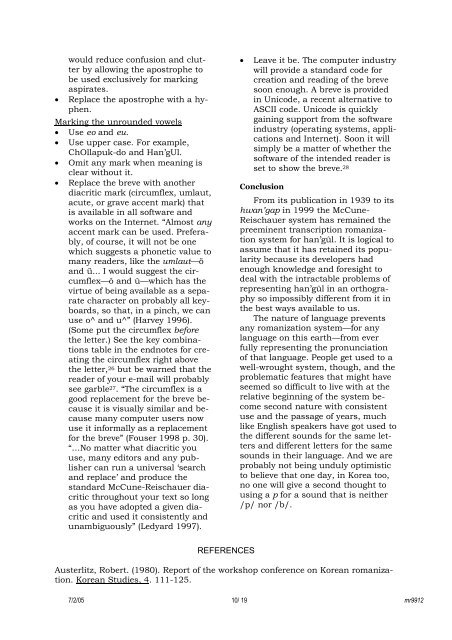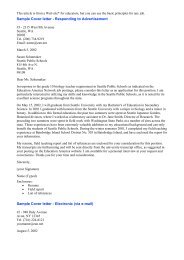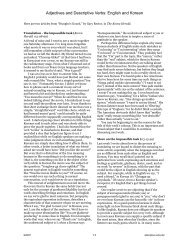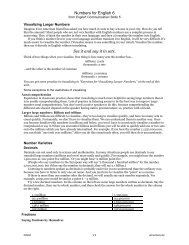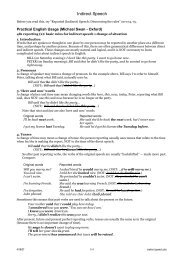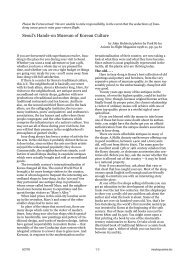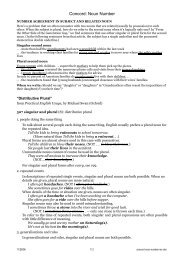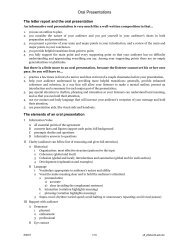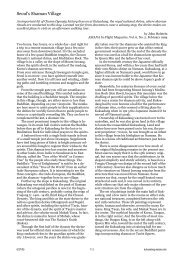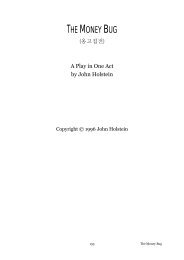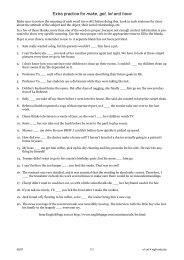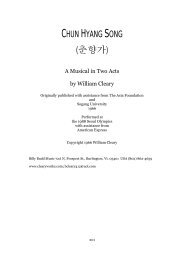The McCune-Reischauer Korean Romanization ... - Korea Mosaic
The McCune-Reischauer Korean Romanization ... - Korea Mosaic
The McCune-Reischauer Korean Romanization ... - Korea Mosaic
You also want an ePaper? Increase the reach of your titles
YUMPU automatically turns print PDFs into web optimized ePapers that Google loves.
would reduce confusion and clutter<br />
by allowing the apostrophe to<br />
be used exclusively for marking<br />
aspirates.<br />
• Replace the apostrophe with a hyphen.<br />
Marking the unrounded vowels<br />
• Use eo and eu.<br />
• Use upper case. For example,<br />
ChOllapuk-do and Han’gUl.<br />
• Omit any mark when meaning is<br />
clear without it.<br />
• Replace the breve with another<br />
diacritic mark (circumflex, umlaut,<br />
acute, or grave accent mark) that<br />
is available in all software and<br />
works on the Internet. “Almost any<br />
accent mark can be used. Preferably,<br />
of course, it will not be one<br />
which suggests a phonetic value to<br />
many readers, like the umlaut—ö<br />
and ü... I would suggest the circumflex—ô<br />
and û—which has the<br />
virtue of being available as a separate<br />
character on probably all keyboards,<br />
so that, in a pinch, we can<br />
use o^ and u^” (Harvey 1996).<br />
(Some put the circumflex before<br />
the letter.) See the key combinations<br />
table in the endnotes for creating<br />
the circumflex right above<br />
the letter, 26 but be warned that the<br />
reader of your e-mail will probably<br />
see garble 27 . “<strong>The</strong> circumflex is a<br />
good replacement for the breve because<br />
it is visually similar and because<br />
many computer users now<br />
use it informally as a replacement<br />
for the breve” (Fouser 1998 p. 30).<br />
“…No matter what diacritic you<br />
use, many editors and any publisher<br />
can run a universal ‘search<br />
and replace’ and produce the<br />
standard <strong>McCune</strong>-<strong>Reischauer</strong> diacritic<br />
throughout your text so long<br />
as you have adopted a given diacritic<br />
and used it consistently and<br />
unambiguously” (Ledyard 1997).<br />
• Leave it be. <strong>The</strong> computer industry<br />
will provide a standard code for<br />
creation and reading of the breve<br />
soon enough. A breve is provided<br />
in Unicode, a recent alternative to<br />
ASCII code. Unicode is quickly<br />
gaining support from the software<br />
industry (operating systems, applications<br />
and Internet). Soon it will<br />
simply be a matter of whether the<br />
software of the intended reader is<br />
set to show the breve. 28<br />
Conclusion<br />
From its publication in 1939 to its<br />
hwan’gap in 1999 the <strong>McCune</strong>-<br />
<strong>Reischauer</strong> system has remained the<br />
preeminent transcription romanization<br />
system for han’gûl. It is logical to<br />
assume that it has retained its popularity<br />
because its developers had<br />
enough knowledge and foresight to<br />
deal with the intractable problems of<br />
representing han’gûl in an orthography<br />
so impossibly different from it in<br />
the best ways available to us.<br />
<strong>The</strong> nature of language prevents<br />
any romanization system—for any<br />
language on this earth—from ever<br />
fully representing the pronunciation<br />
of that language. People get used to a<br />
well-wrought system, though, and the<br />
problematic features that might have<br />
seemed so difficult to live with at the<br />
relative beginning of the system become<br />
second nature with consistent<br />
use and the passage of years, much<br />
like English speakers have got used to<br />
the different sounds for the same letters<br />
and different letters for the same<br />
sounds in their language. And we are<br />
probably not being unduly optimistic<br />
to believe that one day, in <strong>Korea</strong> too,<br />
no one will give a second thought to<br />
using a p for a sound that is neither<br />
/p/ nor /b/.<br />
REFERENCES<br />
Austerlitz, Robert. (1980). Report of the workshop conference on <strong><strong>Korea</strong>n</strong> romanization.<br />
<strong><strong>Korea</strong>n</strong> Studies, 4. 111-125.<br />
7/2/05 10/ 19 mr9912


